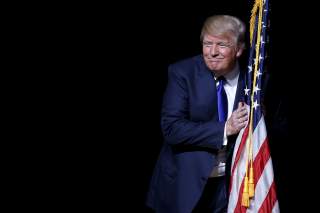Trump Doesn't Have the Global Clout to Put America First
Leadership-through-persuasion tactics are necessary for an America that wants to advance its interests.
The Pew Research Center has released results of the latest survey in its annual series of public opinion polls tracking attitudes in twenty-five foreign countries. Donald Trump’s numbers are bad. On the central question of whether people have confidence in a leader “to do the right thing regarding world affairs,” 27 percent of respondents worldwide expressed confidence in Trump, and 70 percent no confidence. This put him behind the other leaders about which this question was asked, especially German chancellor Angela Merkel, in whom 52 percent expressed confidence, and French president Emmanuel Macron, at 46 percent. Trump even finished behind Chinese president Xi Jinping (34 percent) and Russian president Vladimir Putin (30 percent). Trump’s numbers also compare unfavorably, especially in European countries, with the numbers for Barack Obama when the same questions were asked during his presidency.
A conspicuous exception to these patterns is opinion in Israel, where, in what is nearly the complete opposite from opinion in the rest of the world, Trump gets a positive rating of 69 percent. (He scored 56 percent positive in Israel last year.) This is probably good news from the perspective of those who are most concerned about what they regard as Israel’s interests, as distinct from those focused on U.S. interests.
It is fair to ask how much any of this matters. Poll numbers, after all, are not themselves a U.S. interest. The unilateralist, nationalist, mercantilist tendencies of the Trump administration can be seen as a statement that the popularity abroad of a U.S. administration does not and should not make a difference. One can argue that popularity is one thing but that respect and power are very different things.
The sorts of public attitudes that the Pew survey taps—which heavily shape the political environments in which foreign governments must operate—are very much linked, however, to the ability of the United States to defend and advance its interests overseas. For one thing, confidence numbers for individual U.S. presidents correlate highly with reported views, positive or negative, of the United States itself. Pew presents a graph of how German attitudes, for example, on each of these two dimensions have changed during the past two decades. The two lines both trend downward during the presidency of George W. Bush, then spurt upward at the start of the Obama presidency and stay relatively high, then both drop precipitously with the election of Trump.
Further significance of the findings can be found in the wordings of the questions. Besides the one about confidence in a president doing the “right thing” in world affairs, Pew also asks whether the United States “takes into account the interests of countries like ours.” The United States, over several administrations, has always had problems looking good on the latter question. But again, the numbers have become significantly worse under Trump, both worldwide and in a majority of the countries surveyed.
Attitudes tapped by these questions determine whether people, and thus their nations, are susceptible to influence by being persuaded that a course of action is the right thing to do and is in their interests. Such persuasion is the core of leadership, globally as well as locally.
And leadership-through-persuasion is necessary for most of what the United States would like to see happen and most of what would advance U.S. interests. Very few desirable things in world affairs can be accomplished directly by unilateral action—maybe an instance or two of using military force to destroy something. But even most endeavors that involve military force entail inducing some other government to make a desired decision.
Most respondents in the Pew survey want the United States to play a global leadership role, more so than wanting China or some other unspecified country to perform that function. The appetite for leadership is there, but surveyed opinion suggests that the United States is not currently playing such a role well.
It is not entirely a coincidence that these survey results come out in the week after the U.S. president was a laughingstock before the world’s representatives at the United Nations General Assembly. Popularity is different from respect, but they are connected, and both seem to be lacking right now.
Paul R. Pillar is a contributing editor at the National Interest and the author of Why America Misunderstands the World.
Image: Reuters

